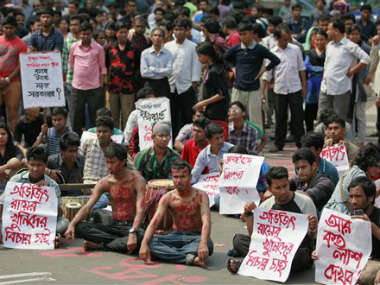Three suspected Islamists were today arrested in Bangladesh in a pre-dawn raid, as authorities intensified a crackdown on extremists following the brutal killing of American blogger Avijit Roy in the capital.
Acting on a tip-off, elite anti-crime Rapid Action Battalion (RAB) conducted a pre-dawn raid at a five-storey building in the northeastern port city of Chittagong and arrested three suspected militants.
“We have seized 30 grenades…It appears they (militants) could have made some 300-400 bombs with the explosives we found at the den,” RAB’s commanding officer in Chittagong Lt Col Mista Uddin told reporters in a primary briefing.
Huge cache of explosives and weapons was seized from their possession, he said, adding that more details, including the identity of the Islamist outfit, would be given at a press conference later.
The raid came two days after Roy known for his critique of religious extremism was hacked to death in the Dhaka University area by machete-wielding assailants who attacked the Bangladeshi-origin writer.
Roy was returning from a book fair with his wife on Thursday evening when the attack occurred. His wife and fellow blogger Rafida Ahmed Banna was seriously injured as she tried to defend him.
The killing that apparently took place right in front of a police barricade put up to restrict vehicular movement on the adjacent road for the ongoing book fair sparked countrywide protests and international condemnation.
A bio-engineer and naturalised US citizen, Roy also earned a repute of being a writer, He was here to attend Bangladesh’s annual February or Ekushey Book Fair in memory of 1952 Language Movement martyrs.
Roy’s family and friends said Islamist radicals had been threatening him in recent weeks because he maintained a blog ‘Mukto-mona’ or ‘Freemind’ that highlighted humanist and rationalist ideas and condemned religious extremism.
“They (Islamists) are behind the murder of my son,” Roy’s octogenarian father famous physicist Ajay Roy earlier said after coming out of a police station filing a murder case.
Doctors who carried out the autopsy on the body said professionals appeared to have carried out the murder as they struck three blows “very expertly and with ferocity” on Roy’s head, causing his death from profuse bleeding.
Police said they were investigating the involvement of Ansarullah Bangla Team, an Islamist extremist group based in Bangladesh, that claimed responsibility for the murder.
In an internet posting months ago, they had said: “It is not possible to kill Avijit at the moment since he lives in the US. But he will be killed when he will come to Dhaka.”
A twitter account in the name of ‘Ansar Bangla 7’ described Roy’s murder as an ‘achievement’, saying “A great success today here in #Bangladesh. Target is Down” while a series of subsequent tweets called the murder as a punishment for his “crime against Islam”.
Today’s was the second such raid since February 22 when RAB unearthed a militants’ training camp at rugged Banshkhali area in the Chittagong region and arrested five persons along with huge amount of firearms and training equipment.
Meanwhile, civil society figures and youngsters staged rallies here while major newspapers carried editorials, demanding justice.
This was the second such murder of a writer at the February Book Fair scene since the attack on famous Bangladeshi writer and Dhaka University professor Humayun Azad who subsequently died of his wounds in Germany.
The militants later also killed another blogger Rajib Haidar in 2013 here.
The US condemned Roy’s murder in the “strongest terms”, calling it “horrific in its brutality and cowardice”.
British High Commissioner in Dhaka Robert Gibson tweeted: “shocked by the savage murder of #AvijitRoy as I am by all the violence that has taken place in #Bangladesh in recent months.”
The Centre for Inquiry, a US-based nonprofit group Roy wrote for, said it was “shocked and heartbroken” by the murder, adding “Dr Roy was a true ally, a courageous and eloquent defender of reason, science, and free expression, in a country where those values have been under heavy attack”.
Media group Reporters Without Borders rated Bangladesh 146th among 180 countries in a ranking of press freedom last year.
The killing came amid a continued unrest since January 6, when Bangladesh Nationalist Party (BNP) of former prime minister Khaleda Zia launched a violent non-stop nationwide blockade. Over 110 people have been killed since then, mostly in arson attacks on buses and trucks by suspected blockaders.
Security experts have expressed fears that the focus of law enforcement agencies in tackling the unrest has created space for the extremist elements to reorganise or regroup after years of anti-militancy security clampdown virtually destroyed their networks.
Brussels-based International Crisis Group (ICG) earlier this month came up with a report, saying the extremists and criminal networks could exploit the resulting political void caused by extreme hostility between Prime Minister Sheikh Hasina’s ruling Awami League (AL) and her archrival Zia’s BNP.
“Violent Islamist factions are already reviving, threatening the secular, democratic order. While jihadi forces see both parties as the main hurdle to the establishment of an Islamic order, the AL and the BNP perceive each other as the main adversary,” the ICG report read.
PTI








